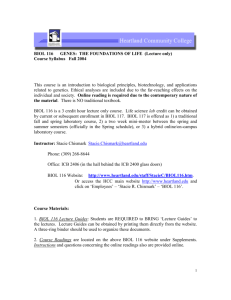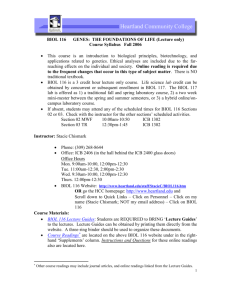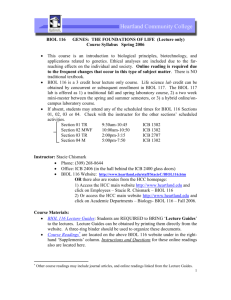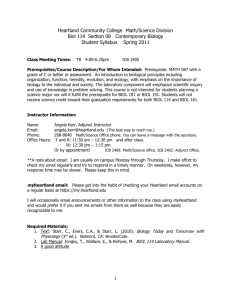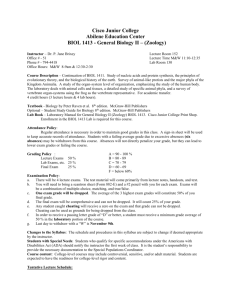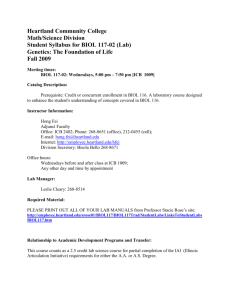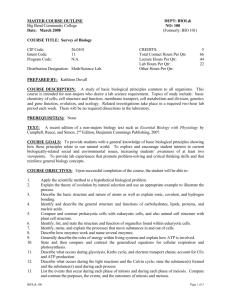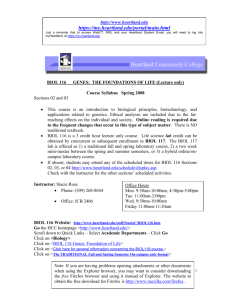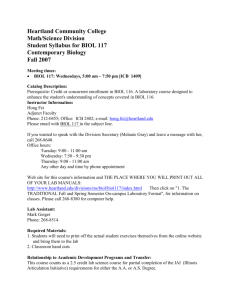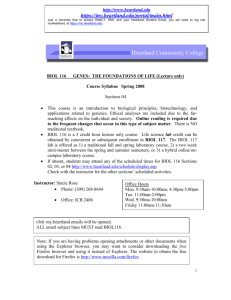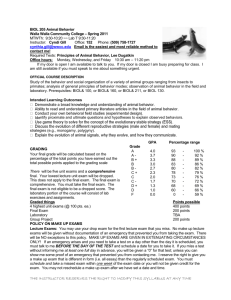biol 116 01 chismark - Heartland Community College
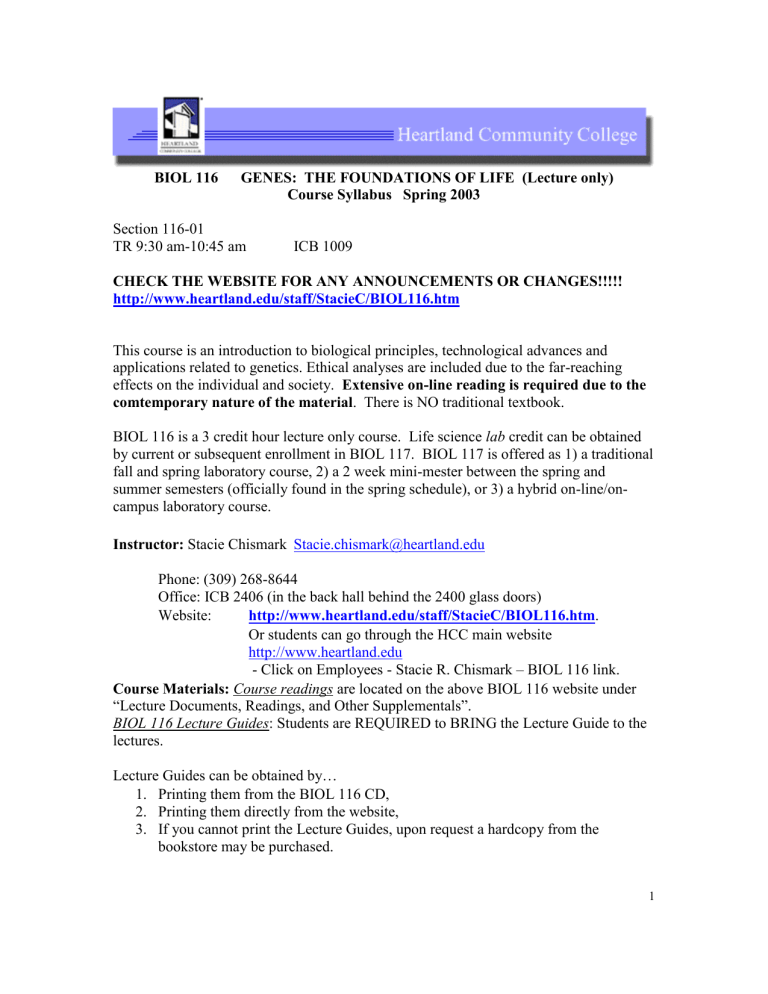
BIOL 116 GENES: THE FOUNDATIONS OF LIFE (Lecture only)
Course Syllabus Spring 2003
Section 116-01
TR 9:30 am-10:45 am ICB 1009
CHECK THE WEBSITE FOR ANY ANNOUNCEMENTS OR CHANGES!!!!! http://www.heartland.edu/staff/StacieC/BIOL116.htm
This course is an introduction to biological principles, technological advances and applications related to genetics. Ethical analyses are included due to the far-reaching effects on the individual and society.
Extensive on-line reading is required due to the comtemporary nature of the material . There is NO traditional textbook.
BIOL 116 is a 3 credit hour lecture only course. Life science lab credit can be obtained by current or subsequent enrollment in BIOL 117. BIOL 117 is offered as 1) a traditional fall and spring laboratory course, 2) a 2 week mini-mester between the spring and summer semesters (officially found in the spring schedule), or 3) a hybrid on-line/oncampus laboratory course.
Instructor: Stacie Chismark Stacie.chismark@heartland.edu
Phone: (309) 268-8644
Office: ICB 2406 (in the back hall behind the 2400 glass doors)
Website: http://www.heartland.edu/staff/StacieC/BIOL116.htm
.
Or students can go through the HCC main website http://www.heartland.edu
- Click on Employees - Stacie R. Chismark – BIOL 116 link.
Course Materials: Course readings are located on the above BIOL 116 website under
“Lecture Documents, Readings, and Other Supplementals”.
BIOL 116 Lecture Guides : Students are REQUIRED to BRING the Lecture Guide to the lectures.
Lecture Guides can be obtained by…
1.
Printing them from the BIOL 116 CD,
2.
Printing them directly from the website,
3.
If you cannot print the Lecture Guides, upon request a hardcopy from the bookstore may be purchased.
1
Student Responsibilities:
1.
Students must attend and actively participate in all lecture and group sessions. Bring appropriate materials to lecture. Complete assignments, using the required format, and turn them in on time.
2.
Students must read and spend enough time in independent study to master the material. If the student is having difficulty with a particular topic, tutors may be available at the ASC.
3.
Study often and early for exams. Students should follow the instructions in the Self-Tests found at the end of the Lecture Guides. They are an invaluable resource for successful studying of exams. Write down questions to ask before the lectures and exams. Take exams/quizzes as scheduled.
4.
Students must review the syllabus periodically to refresh their memory concerning information provided therein.
5.
Students must exhibit courtesy and respect for their fellow students, as well as the instructor. Inappropriate talking or behavior during class will not be allowed.
6.
Lecture notes are provided at that time – the LECTURE. Take thorough notes in lecture; write down everything the instructor writes and says . It is the student’s responsibility, if absent, to obtain copies of the notes from another student ; the instructor will never provide lecture notes.
7.
Do not procrastinate.
Course Policies
1.
To ensure fair and equal evaluation, students are required to read the syllabus and sign a contract stating that they understand and will abide by the syllabus policies. If for some reason a student cannot abide by these policies, he/she should not sign the contract and must contact the instructor immediately.
Contract due date:
2.
Exams:
Accommodation for an emergency : If you miss one exam because you are sick, attending a funeral, in a coma, have been kidnapped, going on a trip, miss your bus, your car breaks down, etc., the exam grade will be dropped without penalty . ONLY USE
THIS OPTION IN CASE OF AN EMERGENCY . A poor grade on a previous exam is not an excuse to make up a missed exam. A zero will be recorded for any further missed exams.
If you are able to take all regular exams/quizzes, your lowest grade will be dropped.
Cheating will result in an automatic “F” in the course, no exceptions.
2
3 . Assignments:
Some assignments are group projects requiring attendance and participation. These assignments may involve several lecture periods. If a student does not attend all applicable lecture periods, 75% of the project grade will be deducted. The remaining
25% only will be awarded if the appropriate material is turned in correctly and on time.
4 . Attendance:
College students are adults. Although attendance will be taken at each class meeting, it is not included as part of your grade. Adults have priorities, and these may involve missing class. Your grade in the course will reflect the priority you give it.
"You don't get to control any outcome, just every choice
you make along the way." Stephen Paul
5.
Tardies
Scheduled class times reflect the start of the lecture , not when students should walk through the door. Tardies are disruptive and will be recorded.
Please let the instructor know if there are extenuating circumstances that may cause lateness.
6.
Syllabi disclaimer
This syllabus is subject to change. It is your responsibility to attend lectures or, if absent, contact the instructor for any verbal or written changes.
Course Objectives
1. To understand cellular structures, functions, and biological organization.
2. To obtain basic knowledge of the structure and functions of proteins and nucleic acids.
3. To understand scientific principles of DNA typing and case studies.
4. To gain knowledge of complex traits, including behavior, and the dynamic relationship between genes and environment.
5. To attain knowledge of selected genetic disorders.
6. To obtain knowledge of genetic engineering, including gene therapy and cloning.
7. To gain knowledge of the Human Genome Project and related programs- including their implications concerning ethics and public policy.
Student Evaluation
Grading scale: 90-100%
80-89%
70-79%
60-69%
A
B
C
D below 60% F
3
Assignments and Exams
Total Points Possible
5 regular Exams
2 quizzes
HGP Debate
Final Exam
(100pt. each, one missed/dropped)
(15pt. Each)
400pt.
30pt.
20pt.
100pt.
Total: 550pt.
Academic Integrity
Academic integrity is a fundamental principle of collegial life at Heartland Community
College and is essential to the credibility of the College’s educational programs.
Moreover, because grading may be competitive, students who misrepresent their academic work violate the right of their fellow students. The College, therefore, views any act of academic dishonest as a serious offense requiring disciplinary measures, including course failure, suspension, and even expulsion from the College. In addition, an act of academic dishonesty may have unforeseen effects far beyond any officially imposed penalties.
Violations of academic integrity include, but are not limited to cheating, aiding or suborning cheating or other acts of academic dishonesty, plagiarism, misrepresentation of data, falsification of academic records or documents and unauthorized access to computerized academic or administrative records or systems. Definitions of these violations may be found in the college catalog.
Support Services:
Heartland Library Information
Tutoring and Academic Support www.hcc.cc.il.us/library
Heartland Community College offers learning assistance in various forms at no cost to
Heartland students at the Academic Support Center (ASC) in Bloomington and at the
Pontiac and Lincoln Centers. Tutors are available at convenient times throughout the week. Study groups, group tutoring facilitated by a specially-trained tutor, are also available by request. Help is also provided through instructional materials, study skills workshops, open computing, and the Library.
4
Lecture Outline &
Tentative Exam Schedule
I.
Introduction to Course.
II.
Lecture Guide: The Cell.
III.
Lecture Guide: Structure of DNA.
IV.
(~Feb. 4) Exam 1 (Cells, Structure of DNA).
V.
Lecture Guide: Functions of DNA
VI.
Human Genome Project a.
HGP Information Website b.
Debate
VII.
(~Feb. 27) Exam 2 (Functions of DNA, HGP I)
VIII.
Lecture Guide: DNA Typing History
IX.
Lecture Guide: DNA Typing Procedures RFLP
X.
(~Mar. 6) Quiz 1 (DNA Typing History and RFLP)
XI.
Lecture Guide: PCR
XII.
Lecture Guide: STRs
XIII.
(~Mar. 27) Quiz 2 (DNA Typing PCR/STRs)
XIV.
Lecture Guide: Interpreting DNA Typing Data
XV.
Lecture Guide: DNA Typing Applications
XVI.
(~Mar. 28) Exam 3 (DNA Typing)
XVII.
Lecture Guide: Meiosis and Sexual Reproduction
XVIII.
Lecture Guide: Complex Traits
XIX.
(~ April 10) Exam 4 (Meiosis & Sexual Reproduction, Complex Traits)
XX.
Lecture Guide: Genetics of Sex
XXI.
Lecture Guide: Genetic Engineering
XXII.
Lecture Guide: Gene Therapy
XXIII.
Lecture Guide: Cloning
XXIV.
(~May 6) Exam 5 (Genetics of Sex, Genetic Engineering, Gene Therapy,
Cloning)
XXV.
Comprehensive Final Exam : Thurs. May 15, 8:00am
5
BIOL 116 Genes: The Foundations of Life
Spring 2003, 116-01
Student Contract
You must sign this form before the instructor will record any grades.
I, (print your name) , read, understand, and will abide by the policies listed below as stated in the lecture syllabi.
Signature:
Date:
1. Student Responsibilities
2.
Course Policies concerning… a.
Regular Exams & Accommodations for a missed exam b. Cheating and Academic Integrity c. Attendance & Participation with Group Projects d. Regular Attendance and Tardies
3. BIOL 116 Course Website Readings & Required Course Materials
4. Lecture Guides & Self-tests
5. Syllabus disclaimer
6. Course Objectives
7. Student Evaluation
8. Support Services: HCC computing and tutoring
9. Lecture Schedule
6
